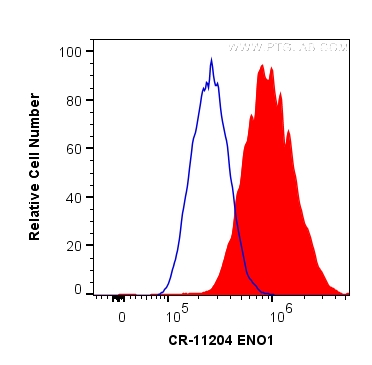验证数据展示
经过测试的应用
| Positive FC (Intra) detected in | HeLa cells |
推荐稀释比
| 应用 | 推荐稀释比 |
|---|---|
| Flow Cytometry (FC) (INTRA) | FC (INTRA) : 0.20 ug per 10^6 cells in a 100 µl suspension |
| It is recommended that this reagent should be titrated in each testing system to obtain optimal results. | |
| Sample-dependent, Check data in validation data gallery. | |
产品信息
CR-11204 targets ENO1 in FC (Intra) applications and shows reactivity with human, mouse, rat samples.
| 经测试应用 | FC (Intra) Application Description |
| 经测试反应性 | human, mouse, rat |
| 免疫原 |
CatNo: Ag1692 Product name: Recombinant human ENO1 protein Source: e coli.-derived, PGEX-4T Tag: GST Domain: 2-434 aa of BC015641 Sequence: SILKIHAREIFDSRGNPTVEVDLFTSKGLFRAAVPSGASTGIYEALELRDNDKTRYMGKGVSKAVEHINKTIAPALVSKKLNVTEQEKIDKLMIEMDGTENKSKFGANAILGVSLAVCKAGAVEKGVPLYRHIADLAGNSEVILPVPAFNVINGGSHAGNKLAMQEFMILPVGAANFREAMRIGAEVYHNLKNVIKEKYGKDATNVGDEGGFAPNILENKEGLELLKTAIGKAGYTDKVVIGMDVAASEFFRSGKYDLDFKSPDDPSRYISPDQLADLYKSFIKDYPVVSIEDPFDQDDWGAWQKFTASAGIQVVGDDLTVTNPKRIAKAVNEKSCNCLLLKVNQIGSVTESLQACKLAQANGWGVMVSHRSGETEDTFIADLVVGLCTGQIKTGAPCRSERLAKYNQLLRIEEELGSKAKFAGRNFRNPLAK 种属同源性预测 |
| 宿主/亚型 | Rabbit / IgG |
| 抗体类别 | Polyclonal |
| 产品类型 | Antibody |
| 全称 | enolase 1, (alpha) |
| 别名 | 2-phospho-D-glycerate hydro-lyase, Alpha-enolase, C-myc promoter-binding protein, EC:4.2.1.11, ENO1L1 |
| 计算分子量 | 47 kDa |
| 观测分子量 | 47 kDa |
| GenBank蛋白编号 | BC015641 |
| 基因名称 | ENO1 |
| Gene ID (NCBI) | 2023 |
| ENSEMBL Gene ID | ENSG00000074800 |
| RRID | AB_2934333 |
| 偶联类型 | Cardinal Red™ Fluorescent Dye |
| 最大激发/发射波长 | 592 nm / 611 nm |
| 激发激光 | Yellow-Green Laser (561 nm) |
| 形式 | Liquid |
| 纯化方式 | Antigen affinity purification |
| UNIPROT ID | P06733 |
| 储存缓冲液 | PBS with 50% glycerol, 0.05% Proclin300, 0.5% BSA, pH 7.3. |
| 储存条件 | Store at -20°C. Avoid exposure to light. Stable for one year after shipment. Aliquoting is unnecessary for -20oC storage. |
背景介绍
Enolase is an important glycolytic enzyme involved in the interconversion of 2-phosphoglycerate to phosphoenolpyruvate.Enolase were down-regulated in oxLDL-treated cells or in VLDL-treated cells .And it identified which are associated with glucose metabolism were down-regulated in the process of foam cells formation.(19756395)
实验方案
| Product Specific Protocols | |
|---|---|
| FC protocol for Cardinal Red™ ENO1 antibody CR-11204 | Download protocol |
| Standard Protocols | |
|---|---|
| Click here to view our Standard Protocols |


